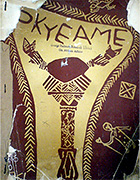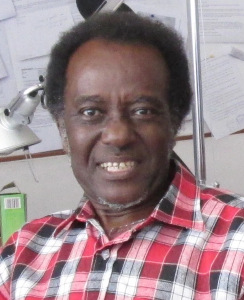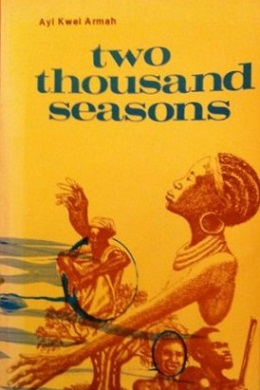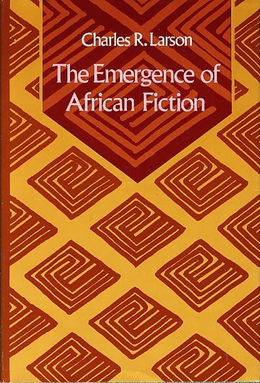
Chinua Achebe was a Nigerian novelist, poet, and critic who is regarded as a central figure of modern African literature. His first novel and magnum opus, Things Fall Apart (1958), occupies a pivotal place in African literature and remains the most widely studied, translated, and read African novel. Along with Things Fall Apart, his No Longer at Ease (1960) and Arrow of God (1964) complete the "African Trilogy". Later novels include A Man of the People (1966) and Anthills of the Savannah (1987). In the West, Achebe is often referred to as the "father of African literature", although he vigorously rejected the characterization.
The African Writers Series (AWS) is a collection of books written by African novelists, poets and politicians. Published by Heinemann, 359 books appeared in the series between 1962 and 2003.
African literature is literature from Africa, either oral ("orature") or written in African and Afro-Asiatic languages. Examples of pre-colonial African literature can be traced back to at least the fourth century AD. The best-known is the Kebra Negast, or "Book of Kings."
Elechi Amadi was a Nigerian author and soldier. He was a former member of the Nigerian Armed Forces. He was an author of plays and novels that are generally about African village life, customs, beliefs, and religious practices prior to contact with the Western world. Amadi is best regarded for his 1966 debut novel, The Concubine, which has been called "an outstanding work of pure fiction".

The Beautyful Ones Are Not Yet Born is the debut novel by Ghanaian writer Ayi Kwei Armah. It was published in 1968 by Houghton Mifflin, and then republished in the influential Heinemann African Writers Series in 1969. The novel tells the story of an unnamed man who struggles to reconcile himself with the reality of post-independence Ghana.
Mildred Kiconco Barya is a writer and poet from Uganda. She was awarded the 2008 Pan African Literary Forum Prize for Africana Fiction, and earlier gained recognition for her poetry, particularly her first two collections, Men Love Chocolates But They Don't Say (2002) and The Price of Memory: After the Tsunami (2006).

Okyeame was a literary magazine founded by the Ghana Society of Writers in the post-Independence era, which saw the rapid rise of a new generation of thinkers, writers and poets in the country. The first issue of Okyeame appeared in 1960, and issues were published, at irregular intervals, up until 1972. Inspired by Kwame Nkrumah, the first Prime Minister of Ghana, the publication sought to explore the experiences of Africa from a new intellectual framework. Writers published in the magazine include its first editor Kofi Awoonor, Efua Sutherland, Ayi Kwei Armah and Ama Ata Aidoo.

Osiris Rising: A Novel of Africa Past, Present and Future is a novel written by Ayi Kwei Armah and published in 1995. The story revolves around an African-American woman, Ast, who goes to Africa looking for heritage after she gets her PhD. The text addresses a number of contemporary African issues, including the residual colonial institutions that limit African culture, the hypocritical nature of African Americans and expatriates who try to help Africa and the contemplation of "What is African history and culture?" The book is published by Per Ankh, a Senegalese publishing company.
Benjamin Kwakye is a Ghanaian novelist and lawyer. His first novel, The Clothes of Nakedness, won the 1999 Commonwealth Writers' Prize, best first book, Africa, and has been adapted for radio as a BBC Play of the Week. His novel The Sun by Night won the 2006 Commonwealth Writers' Prize, Best Book Africa. His novel The Other Crucifix won the 2011 IPPY award. His is also the winner of the 2021 African Literature Association's Book of the Year Award for Creative Writing.
Solomon Alexander Amu Djoleto is a Ghanaian writer and educator.

B. Kojo Laing or Bernard Kojo Laing was a Ghanaian novelist and poet, whose writing is characterised by its hybridity, whereby he uses Ghanaian Pidgin English and vernacular languages alongside standard English. His first two novels in particular – Search Sweet Country (1986) and Woman of the Aeroplanes (1988) – were praised for their linguistic originality, both books including glossaries that feature the author's neologisms as well as Ghanaian words.

The Beautyful Ones Are Not Yet Born is a jazz album by Branford Marsalis, leading a trio with Jeff "Tain" Watts and Robert Hurst and with guest appearances from Wynton Marsalis and Courtney Pine. It was recorded May 16–18, 1991, at CTS Studio A, Wembley, England, and June 24, 1991, at RCA Studio B in New York, New York. It peaked at number 3 on the Top Jazz Albums chart.

Two Thousand Seasons is a novel by Ghanaian novelist Ayi Kwei Armah. The novel was first published in 1973 and subsequently published a number of times, including in the influential Heinemann African Writers Series. It is an epic historical novel, attempting to depict the last "two thousand seasons" of African history in one narrative arc following a Pan-African approach.
Kwei-Armah is a Ga surname, which means "to find the way". Notable people with the surname include:

Ayesha Harruna Attah is a Ghanaian-born fiction writer. She lives in Senegal.
This Earth, My Brother is a 1971 novel by Ghanaian novelist Kofi Awoonor published, later republished by Heinemann as part of the influential African Writers Series.
Popenguine-Ndayane is a small village on the shore of the Atlantic Ocean in Senegal, located 70 km south of Dakar, on the Petite Côte, in the department of M'Bour in the region of Thiès Region. Since 2008, it brings together two localities, Popenguine and Ndayane.

The Emergence of African Fiction is a 1972 academic monograph by American scholar Charles R. Larson. It was published initially by Indiana University Press, and again, in a slightly revised edition, in 1978 by Macmillan. Larson's study has elicited very different responses: it was praised as an early and important book in the study and appreciation of African literature in the West, but for others it remained stuck in a Eurocentric, even colonizing mode in which Western aesthetics were still the unspoken standard for artistic assessment.
The Healers is a novel by Ayi Kwei Armah. It was Armah's fifth novel which was published in 1979.
Ghanaian literature is literature produced by authors from Ghana or in the Ghanaian diaspora. The tradition of literature starts with a long oral tradition, was influence heavily by western literature during colonial rule, and became prominent with a post-colonial nationalist tradition in the mid 20th century. The current literary community continues with a diverse network of voices both within and outside the country today, including film, theatre, and modern digital formats such as blogging.









